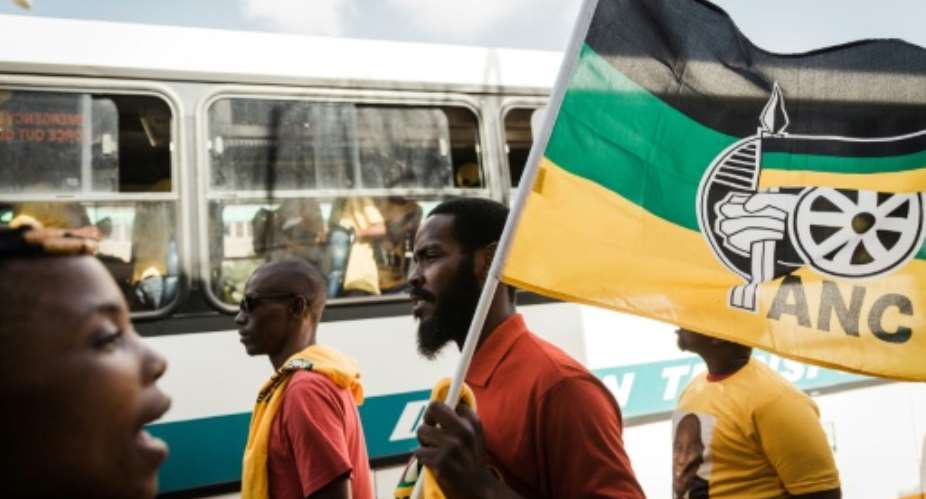A new law forcing parties to disclose financial donations they receive came into effect in South Africa on Thursday, in a closely-followed step to foster transparency and curb corruption.
Since the first democratic elections in 1994, politicians and parties have had carte blanche to collect money from anyone, with little scrutiny.
Now they have to reveal any gifts of 100,000 rand ($6,730) and more, while smaller annual donations from a single source will be capped annually.
Donations from foreign governments, agencies or individuals are also prohibited.
The law "signals a fundamental change in our political landscape," My Vote Counts, a pressure group that fiercely campaigned for the legislation, said on Thursday.
"It will enhance transparency, deter corruption, allow us to better hold political parties accountable and, ultimately, deepen democracy," it said.
Parties and givers will have to disclose donations to the election organiser, the Independent Electoral Commission. Violation of the law is punishable by a fine or jail of of up to five years.
 A South African flag branded with the logo of the opposition Democratic Alliance is moved across the crowd at a DA rally in February 2019. By Wikus DE WET (AFP)
A South African flag branded with the logo of the opposition Democratic Alliance is moved across the crowd at a DA rally in February 2019. By Wikus DE WET (AFP)
The commission's vice chairwoman, Janet Love, has lauded the change as "part of the country's evolution" -- "the most important far-reaching enhancement to the electoral legislative framework since 1994."
Damning allegations of corruption and politicians using public office to further agendas of their benefactors have become a distinguishing feature of South Africa's politics.
The magnitude of that has been highlighted in countless testimonies before anti-graft investigators probing state looting since 2018.
Political leaders, too, have been tarred by the obscure sources of funds.
President Cyril Ramaphosa is under attack over funding for his campaign to be elected leader of the ruling ANC in 2017.
A millionaire who has strong support from the business community, Ramaphosa reportedly received a billion rand ($68 million) from undisclosed sources.
Firebrand Julius Malema's leftist opposition Economic Freedom Fighters (EFF) has gone to court seeking to unseal bank records of the 2017 campaign. The case is still being heard.
"As the president of this country Ramaphosa must lead by example and disclose his funders immediately," the EFF thundered.
But the EFF itself has admitted receiving 200,000 rand from a controversial cigarette manufacturer, Adriano Mazzotti, ahead of the 2014 national general elections, a year after the party was created.
The largest opposition, the Democratic Alliance (DA), meanwhile, came under fire in 2003 for secretly accepting 300,000 rand from wealthy Italian businessman Count Riccardo Agusta in return for permission to develop a private housing estate on a wine farm -- a breach of environmental protection laws.
'Transparency'
In this light, it is unsurprising that the law has struggled to gain party support, say commentators.
"The ultimate goal (of the law) is to ensure transparency and remove any influence of money," said political analyst Ralph Mathekga.
But "there is no single political party that has been enthusiastic about this legislation."
Thirteen parties represented in parliament already receive an annual funding allocation from government, proportional to their representation in parliament.
 Large parties in South Africa have been historically opposed to revealing the source of private donations, say analysts. By Michele Spatari (AFP)
Large parties in South Africa have been historically opposed to revealing the source of private donations, say analysts. By Michele Spatari (AFP)
Most large parties have historically resisted disclosure of private donations.
The DA bemoaned during a recent parliamentary debate that it was "simply impractical and impossible to report the small donations".
The ruling ANC (African National Congress) has voiced concerns around the implications of the new law on donors and also wants state funding to parties to be increased.
"Otherwise, political parties, including opposition tend to rely mainly on private corporates to fund their activities," said ANC treasurer-general, Paul Mashatile.
Approved by parliament in 2018, the bill was signed into law by Ramaphosa in 2019.
It takes effect as the country prepares for local government elections, expected between August and November.





 Reintroduce Fiscal Responsibility Act to tackle election budget overrun — Osafo ...
Reintroduce Fiscal Responsibility Act to tackle election budget overrun — Osafo ...
 Flooding: Obey weather warnings – NADMO to general public
Flooding: Obey weather warnings – NADMO to general public
 Fire in NDC over boycott of Ejisu by-election
Fire in NDC over boycott of Ejisu by-election
 NDC to outdoor Prof Jane Naana Opoku-Agyemang as running mate today
NDC to outdoor Prof Jane Naana Opoku-Agyemang as running mate today
 Ejisu: CPP seeks injunction to stop April 30 by-election
Ejisu: CPP seeks injunction to stop April 30 by-election
 Dismiss ECG, GWCL, GACL bosses over losses – United Voices for Change tells gov’...
Dismiss ECG, GWCL, GACL bosses over losses – United Voices for Change tells gov’...
 Submit 2023 audited financial statements by May – Akufo-Addo order SOEs
Submit 2023 audited financial statements by May – Akufo-Addo order SOEs
 Current power outages purely due to mismanagement – Minority
Current power outages purely due to mismanagement – Minority
 ECG hoists red flag to fight Ashanti Regional Minister over arrest of General Ma...
ECG hoists red flag to fight Ashanti Regional Minister over arrest of General Ma...
 Mahama’s 24hr economy will help stabilise the cedi; it’s the best sellable polic...
Mahama’s 24hr economy will help stabilise the cedi; it’s the best sellable polic...
